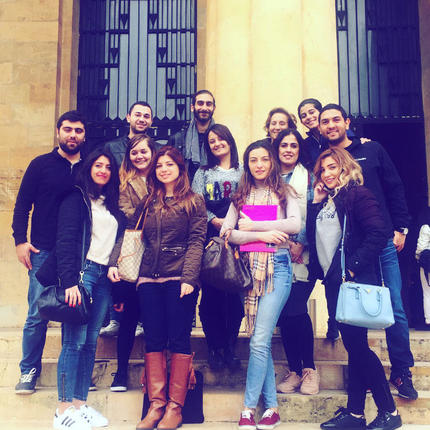Visiting Harvard professor runs postgraduate course on migration
Professor Peggy Levitt of Wesley College gives a two-week course on migrating people and culture and discusses transnational social welfare with her LAU peers.
Harvard professor Peggy Levitt has concluded her first visit to Lebanon where she taught a postgraduate course entitled ‘Migrating People, and Cultures’ to students of the M.A. in Migration Studies. “I learned so much during my time here,” said the professor of her experience at LAU. “The material and theories I presented were developed in the U.S., and through discussions with the students and cultural actors in the country, I learned a great deal about how Lebanese people view the concept of nations and cohesion.”
Levitt and her LAU students visited a number of sites during the intensive two-week course, taking in the Sursock, National, and Beirut museums. “I wanted the students to be aware of and document the different representations of Lebanese nationalism at each site,” explained the professor.
“We learned so much in a very interactive way,” said student Karim Ziade. In addition to off-site visits and discussions about identity and culture, the students watched videos, gave presentations and conducted surveys.
“We asked people in Lebanon to identify things they considered national treasures and national rubbish and many of the responses were unexpected and eye-opening,” added Ziade. Among the treasures cited were the country’s gold reserves, which keep the currency stable, and among the “rubbish” were the cultures of sectarianism, corruption and consumerism, he explained.
The course, instigated by Director of LAU’s Institute of Migration Studies Paul Tabar, was complemented by a lecture, attended by faculty members as well as students, during which Levitt introduced her research on social welfare and transnationalism.
According to the professor, more than one in seven people in the world today is a migrant and almost a quarter of a billion people live in a country in which they do not have citizenship. As such, access to social welfare is often complex, incorporating formal and informal resources from more than one state, explained Levitt. “With the rise in xenophobia and heightened nationalism, and an increase in migration, this issue is particularly timely,” she added. “Some borders may be less permeable now, but others are more so. Mobility will not be stopped. The world is still on the move,” she insisted.
Lebanon, with its huge diaspora and migrant populations, would make a great laboratory for such a study, said LAU Vice President for student enrollment Elise Salem. “The Lebanese are very clever in traversing the cultures they inhabit. Our reality here on the ground is also very interesting.”
More
Latest Stories
- Into the Psychology of Justice
- Alumnus Zak Kassas on Navigation, Spoofing and the Future of GPS
- Hearing Between the Lines
- LAU Hematology Conference 2025: Advancing Science Through Interdisciplinary Exchange
- Dr. Chaouki T. Abdallah Invested as LAU’s 10th President
- LAU Guides Its Students Through the Code of Conduct
- Innovative Procedure at LAU Medical Center–Rizk Hospital Signals Hope for a Patient With a Congenital Disease
- LAU’s Inaugural PodChat Session Addresses AI Detection in the Classroom


